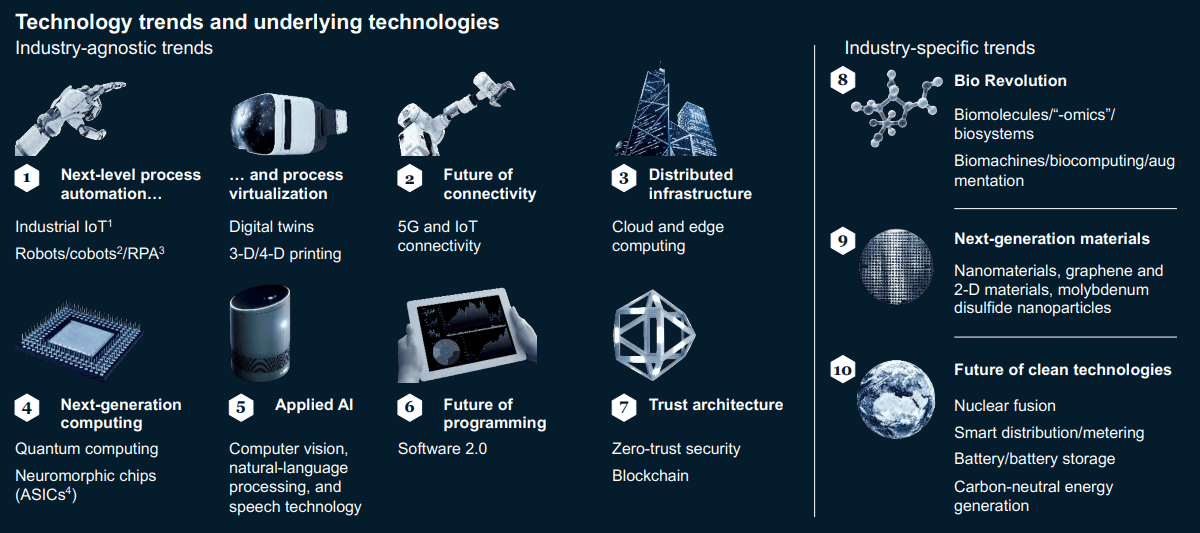This content explores ten emerging technologies that are transforming the way we live, work, and interact. Artificial Intelligence (AI) enables machines to learn and think like humans, while Blockchain technology provides a decentralized and transparent way of recording transactions. Quantum Computing and Internet of Things (IoT) are revolutionary technologies that enable real-time data processing and analysis. 5G networks provide faster and more reliable communication, while Augmented and Virtual Reality provide immersive experiences. Renewable Energy, Biotechnology, Robotics, and 3D Printing are emerging technologies that have the potential to solve some of the world’s biggest challenges. However, there are also risks and challenges that need to be addressed to ensure that these technologies are deployed in a responsible and ethical manner.
1. Artificial Intelligence (AI)
Artificial Intelligence (AI) is a rapidly growing technology that aims to create machines that think and learn like humans. It involves the use of machine learning algorithms that enable computers to learn on their own by recognizing patterns and relationships in data. From self-driving cars to intelligent digital assistants, AI is everywhere around us. It is transforming the way we live, work, and interact.
2. Blockchain Technology
Blockchain technology is a decentralized, distributed ledger that records transactions securely and transparently. It is the backbone of the crypto economy and is being used to revolutionize finance, supply chain management, voting systems, and much more. Blockchain has the potential to replace traditional intermediaries, reduce fraud, and increase trust in online transactions.
3. Quantum Computing
Quantum computing is a revolutionary technology that uses quantum mechanics to process and store information. Unlike classical computers that use binary digits, quantum computers use quantum bits or qubits that can be both 0 and 1 at the same time. Quantum computing has the potential to solve complex problems that are beyond the reach of classical computers, such as drug discovery, weather forecasting, and cryptography.
4. Internet of Things (IoT)
The Internet of Things (IoT) refers to the network of physical objects or “things” that are connected to the internet and can communicate with each other. IoT devices range from smart home appliances to industrial machines and sensors. They enable us to collect and analyze data in real-time, automate tasks, and optimize operations. IoT is transforming industries such as healthcare, agriculture, and manufacturing.
5. 5G Networks
The fifth generation of wireless technology or 5G is a game-changer for the way we connect and communicate. 5G networks are faster, more reliable, and have lower latency than 4G networks. They enable us to stream high-resolution videos, play online games, and download large files in seconds. 5G is also critical for enabling other emerging technologies such as autonomous vehicles and smart cities.
6. Augmented and Virtual Reality
Augmented Reality (AR) and Virtual Reality (VR) are immersive technologies that enable us to experience digital content in a more realistic way. AR overlays digital information onto the real world, while VR creates a completely artificial environment. They are being used in entertainment, education, and training. AR and VR have the potential to transform the way we learn, communicate, and entertain ourselves.
7. Renewable Energy
Renewable Energy is an emerging technology that aims to create sustainable and clean energy sources. It includes solar, wind, hydro, and geothermal power. Renewable energy is becoming more accessible and affordable, and it has the potential to replace fossil fuels and reduce carbon emissions. Renewable energy is critical for combating climate change and ensuring energy security.
8. Biotechnology
Biotechnology is a rapidly growing field that combines biology and technology to create new products and services. It is being used to create new drugs, improve crop yields, and develop renewable materials. Biotechnology has the potential to solve some of the world’s most pressing challenges such as food security, disease prevention, and environmental sustainability.
9. Robotics
Robotics is a field of engineering that deals with the design and development of robots. Robots are machines that are capable of performing tasks that are difficult, dangerous, or impossible for humans. They are being used in manufacturing, healthcare, and space exploration. Robotics has the potential to improve efficiency, reduce costs, and enhance safety in various industries.
10. 3D Printing
3D printing is a technology that enables us to create physical objects from digital designs. It works by layering materials such as plastic, metal, or even human tissue. 3D printing is being used in manufacturing, healthcare, and architecture. It has the potential to revolutionize the way we produce and consume goods by enabling more customization, local production, and reduced waste.
Conclusion
These ten emerging technologies have the potential to shape our future in profound ways. They are transforming the way we live, work, and interact. They have the potential to solve some of the world’s biggest challenges such as climate change, social inequality, and disease prevention. However, as with any emerging technology, there are also risks and challenges that need to be addressed. We need to ensure that these technologies are developed and deployed in a responsible and ethical manner.
